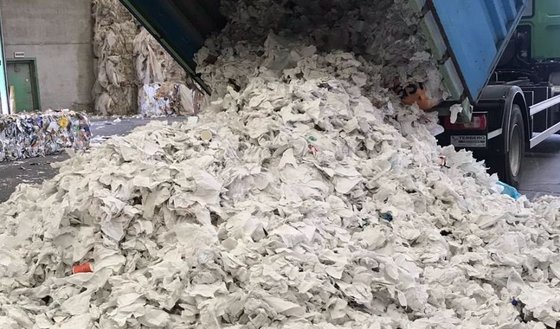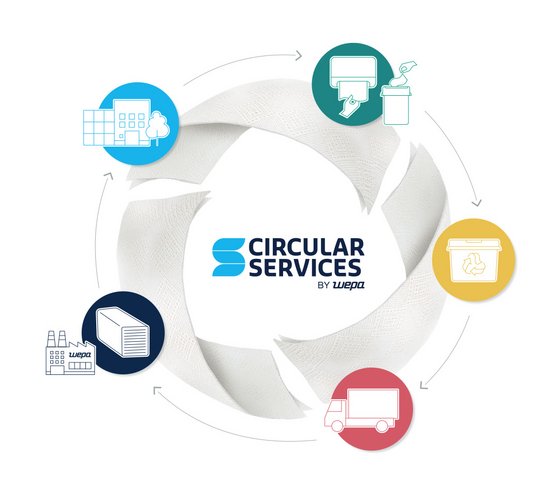

Our aim is to make washrooms more sustainable and circular. With our innovative circular service concept, we invite you as companies and organisations to participate in this proposal.
Thus, used towel papers are no longer disposed of as residual waste at your site but serve as raw material for the production of hygiene paper. This paper is then used again in your organisation's washrooms. Moreover, by keeping the paper in the region, BlackSatino circular concepts avoid unnecessarily burdening the environment.
In this way, you achieve more than just a measurable reduction in residual waste. You secure raw materials and ensure environmental savings in terms of CO2 emissions, energy and water – and you are part of a forward-looking, closed cycle.
In an organisation with 300 FTE's, you save more than 44,900 litres of water and almost 1,600 kg of CO2 annually by using our sustainable toilet paper.
The circular economy model explained
This is what a perfect cycle looks like:
- You collect your company's paper waste (we will be happy to explain how this is ideally done).
- Your paper waste is collected by the waste disposal company and transported to our factory as raw material for BlackSatino hygiene paper.
- The toilet paper we make from it is then delivered back to your company for use in your washrooms via a service and distribution partner.
Together with the partners in this chain, we close a loop at the local level, relieve the environment and take responsibility for the waste and raw material problem.
Do we offer paper collection in your area?
We also support your company with other sanitation services and with internal and external communication about your sustainability activities in the sanitation sector.
Would you like to learn more about our closed-loop service concept? Then take a look at our video and find out how the concept is implemented in practice.
Definition of the circular economy within washrooms
In a time when sustainability and environmental awareness are central, it is important that we also learn how sustainable restrooms can contribute to a circular economy. Let's first look at the meaning of a circular economy.
Unlike traditional economic models, where products are discarded after use, a circular economy aims to close the circular loop by reusing, repairing, and recycling products.
Through innovative techniques and collaborations, organizations can ensure that products are given a new life and that little to no new raw materials need to be extracted from the earth. In this way, waste becomes a resource.
At BlackSatino, we implement these circular principles by offering sustainable sanitary products made from recycled materials that are fully recyclable after use. Our toilet paper rolls, towels, and dispensers are designed to be easily recycled or disassembled after use. This reduces the use of new raw materials and the pressure on the environment.
Creating sustainable toilet areas as a contribution to a circular economy
Traditional sanitary restrooms often have a negative impact on the environment, using non-renewable materials, producing waste, and polluting water sources. BlackSatino, therefore, chooses renewable materials and designs products for reuse and recycling.
Switching to circular sanitary solutions also saves costs in the long run, such as reduced waste disposal costs, lower maintenance costs, and extended product lifespans. BlackSatino’s sustainable products contribute to closing circular loops and keeping the environmental impact as low as possible.
The circular economy model within your organization
We aim to create sustainable products and promote circular principles throughout your organization's entire supply chain. We collaborate with suppliers who share our values and are committed to sustainable processes, from using renewable energy sources during production to minimizing transport emissions.
Additionally, we assist our customers with support for proper waste separation and recycling. Thus, Cradle to Cradle principles are put into practice, and our customers' ecological footprints are reduced.
Taking the first step: Circular procurement within companies
More and more governments and companies recognize the importance of circular procurement. However, companies often have no idea how to benefit from it or how it contributes to a more sustainable future.
Sustainable procurement goes beyond just purchasing products. It involves considering the lifecycle of products, promoting reuse and recycling, and encouraging collaborations with companies.
Beyond cost savings, sustainable procurement offers additional benefits. Choosing sustainable products and embracing the circular economy can positively contribute to your organization's trust among customers, employees, and governments.
Transforming to a circular restroom in your company is the starting point for a more sustainable future. Through collaborations and initiatives that arise in the transition to a circular economy, circular products are gaining more ground. Will you contribute as well?


